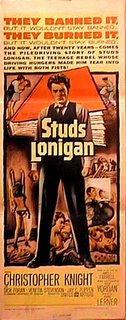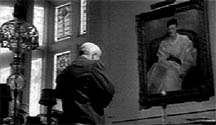 What was I saying about only one Lerner film under my belt? Well, now it's two--this and Murder by Contract ('58), both solid films (Contract's probably better) that make me think, in terms of both tone and subject matter, of the sort of films Scorsese might started out with had he been ten years older. In fact Studs Lonigan, a once-controversial screen adaptation project for Lerner and writer-producer Philip Yordan, seems like a quite viable inspiration for Scorsese's GoodFellas and Casino, possibly also Mean Streets (but it's been too long since I've seen that one). The difference is that in Scorsese's films, characters have the feeling (the thrill) of agency--they get to be movers-and-shakers, and when things come crashing down (or when the thrill simply decomposes into the mundane), it hurts. In Studs Lonigan, our hero (played by Christopher Knight) never even really gets to grasp that sense of being in charge of his own destiny ... he just spends the duration waiting for it. Flirtations with the underworld never go beyond a few fizzled get-rich-quick schemes or mobster handshakes; alcoholism is the greatest vice Studs can get himself into. In a way this makes it all the more pathetic. And if absolution never comes, the film also remains, because of it, more incisive about the vagaries and illusions of middle-class existence than Scorsese's ever are.
What was I saying about only one Lerner film under my belt? Well, now it's two--this and Murder by Contract ('58), both solid films (Contract's probably better) that make me think, in terms of both tone and subject matter, of the sort of films Scorsese might started out with had he been ten years older. In fact Studs Lonigan, a once-controversial screen adaptation project for Lerner and writer-producer Philip Yordan, seems like a quite viable inspiration for Scorsese's GoodFellas and Casino, possibly also Mean Streets (but it's been too long since I've seen that one). The difference is that in Scorsese's films, characters have the feeling (the thrill) of agency--they get to be movers-and-shakers, and when things come crashing down (or when the thrill simply decomposes into the mundane), it hurts. In Studs Lonigan, our hero (played by Christopher Knight) never even really gets to grasp that sense of being in charge of his own destiny ... he just spends the duration waiting for it. Flirtations with the underworld never go beyond a few fizzled get-rich-quick schemes or mobster handshakes; alcoholism is the greatest vice Studs can get himself into. In a way this makes it all the more pathetic. And if absolution never comes, the film also remains, because of it, more incisive about the vagaries and illusions of middle-class existence than Scorsese's ever are.The camerawork (a lot of strange angles from below) seems to be a bit of a marriage of early 1930s Robinson or Cagney vehicles (the film itself takes place during the 1920s) with Cassavetes and Beat energy of the time, the sort of flexed-muscle pulsing improv realism that marked the emergence of Something New on mainstream American screens at the time. (Sorry, is that "x-crossed-with-y" description too The Player-ish?) I can't say that, on one viewing, the film had a particularly clear and meaningful aesthetic organization, but it's in the half-exposed formal blueprints that one may find the most interesting strategy anyway.
At one point, deep in the film, Studs and one of his friends are playing pool. The friend says, "I met a pig last night. How's your love life?" Studs replies, "Catherine and I ... we drink a lot of coffee." At several earlier points in the film, scenes that open up like this in the pool hall may last for several minutes, but right after the coffee line we get a jarring cut to the beach. There are several such jarring cuts which seem to deliberately "rough up" the surface of the smooth classical Hollywood narrative: that is, the film isn't avant-garde or experimental, it isn't a profoundly subversive take on the H'wood narrative--it simply wants to render it less invisible, less taken for granted.
Any Lerner fans out there? What else is worth catching?















